The Search for new Microbes
Professor Hazel Barton, Colonel Clint Murray
Horizon - Defeating the Superbugs
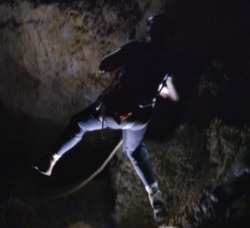
Pot-Holing
Professor Hazel Barton of the University of Akron is tracking down one of humanity's greatest treasures. To find it she has to venture to one of the most
untouched places on earth, hundreds of metres underground.
Hazel Barton "It's finding a hole, nobody knows where it goes and you kind of push and shove your way through, and its spectacular and its beautiful and
you're the first person to see it and you leave the first footprints. And so you get kind of a man in the Moon feeling to be in there."
She's hunting for something that we all take for granted. In these caves are tiny microbes crucial to our survival.
Hazel Barton "Where you want to go is where you can spot bedrock and it's kind of dry but near enough the water that that organic material can leach in.
And so somewhere like here, and you can see, this is one here. These little dots of white here are the colonies of microbes. So those are what we go down
for and those are what we go after."
These tiny microbes are incredibly precious because they can produce life-saving drugs we all rely on. Antibiotics. Professor Barton is going to the
ends of the earth because here she can find new antibiotics. We need new ones, because the ones we have are starting to fail.
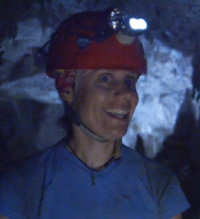
Professor Hazel Barton
Hazel Barton "The last thing you want to do is go to the clinic, give someone the drug that's gonna save their life, and it's not working."
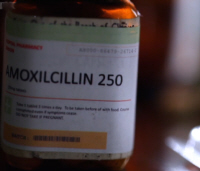
Amoxicillin
Scientists like Professor Barton are going to such extreme lengths because finding new antibiotics is fast becoming the most critical concern.
Antibiotics are one of the miracles of modern medicine.
Since the discovery of penicillin in 1928, they have revolutionised our lives. They have stopped simple cuts developing into life-threatening
infections, saved millions from diseases like cholera, diphtheria and tuberculosis. Antibiotics are so valuable because they stop and destroy the
bacteria that cause these life-threatening diseases. But over the last decade scientists have witnessed outbreaks around the world where antibiotics
we have relied on in the past have stopped working.
These outbreaks have been caused by new types of bacteria. Bacteria that can sweep straight through our antibiotics, and carry on growing.
These are the superbugs. And we are becoming powerless against them. But by studying these outbreaks, scientists are hoping to defeat them.
Brooke Army Medical Center, Texas.

The Brooke Army medical Centre in Texas. Just a few years ago, this renowned military hospital unexpectedly found itself at the frontline of the
war against superbugs.
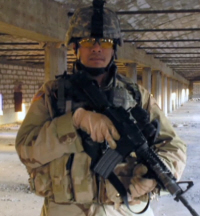
Master Sgt Dan Robles
It started in 2006 when Master Sergeant Dan Robles was just four months into his deployment to Iraq. His unit was on a routine patrol, searching
for a weapons cache.
Dan Robles "It was about two o'clock in the afternoon, Baghdad time. It looked like business as usual, cars driving back and forth, people on
the side of the streets. It was quiet. And there was just a big flash of light, it sounded like I had my head in a bell and someone was pounding
on it real hard. There was smoke everywhere."
The patrol had been hit by an IED which tore into his side of the vehicle.
Dan Robles "Sitting there in the Humvee after the explosion, I looked down and I saw that one part of my leg, my calf muscle, through the
pants of my uniform. And I didn't want to look down after that."
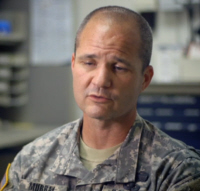
Colonel Clint Murray
He sustained terrible injuries, and ultimately the combat medics were unable to save his legs. Within days, he was back on home soil at the Brooke Army
medical Center, but he was about to face an even tougher battle. His wounds were infected and the usual antibiotics weren't working. So they called in
the Chief of the Infectious Disease Service, Colonel Clint Murray.
Colonel Clint Murray "You're not necessarily sure who the enemy is when you walk in to see your patient. I think it's very similar to what we do in
combat, as we try to figure out what we're doing who we are fighting? Why are we fighting them?"
Colonel Murray discovered that his patient had brought back from Iraq three of the toughest superbugs to beat. - Resistant Acinetobacter Baumanni,
Resistant Pseudomonas Aerusinosa & Methcillin Resistant Staphylococcus Aureus.
The first thing to do was protect the other patients and control the outbreak.
Col Murray "So what we do is we try to isolate all our patients, put them in their private rooms and before we go in and out of those rooms, we
put on gowns and gloves to really prevent the bacteria from getting on us so when we get to the next patient's room we're not taking the bacteria with us."
Now he turned his attention to treating the infection, but his usual arsenal of antibiotics just wouldn't work.
Col Murray "The number of antimicrobial agents we had were limited to treat them. So in contrast to giving them the standard antibiotic we give
anyone that has wounds, we would have to, sort of, we call in a bigger gun, a more powerful antibiotic."
But these powerful antibiotics carry a risk. They're not just toxic to bacteria, they can be toxic to people too.
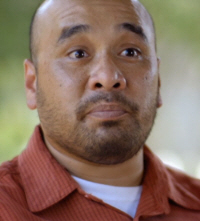
Dan Robles
Dan Robles "I do remember Dr Murray explaining my situation to me, and I was like, okay, let's do it, whatever we got to do."
Like most doctors, Colonel Murray has rarely used these antibiotics because of the damaging side-effects.
Dan Robles "It has started to shut down my kidneys, I went into renal failure. And so he comes back and says we've got to stop the antibiotics"
Col Murray "Based upon that, I really figured out, okay so here are the bacteria and here's how we're helping you, but here's how we're hurting you."
Dan Robles "I knew it was going to be a long fight when it started doing more damage than good."
They had to keep changing the antibiotics as each one became too toxic.
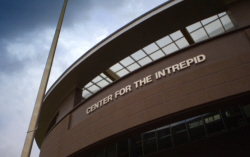
Intrepid Center
Dan Robles "And this time it had shut down my immune system. That was probably the most scary thing ever, out of my whole ordeal. No white blood
cells, no immune system. I had to wear a mask, I was in isolation. Any cold, any… You know, the simple cold could have killed me because I had nothing
to fight it off."
Dan Robles is living a normal life back with his family, but six years after the attack he still comes here to check on his ongoing struggle with
the superbugs. Looking back over the two battles for his life, his fight with the superbugs was the toughest.
Dan Robles "When I was hurt, at least I knew that there was a chance that I would survive, and that things were in place to take care of me and
fix me and make me better. But as far as losing your immune system, there was nothing that any doctor in the hospital could do to keep me from getting
this simple cold that could potentially kill me. That was the scariest. And it was scary because my family was right there with me. And I was more
worried about them watching something like that happen than the coming back from Iraq in a box."







